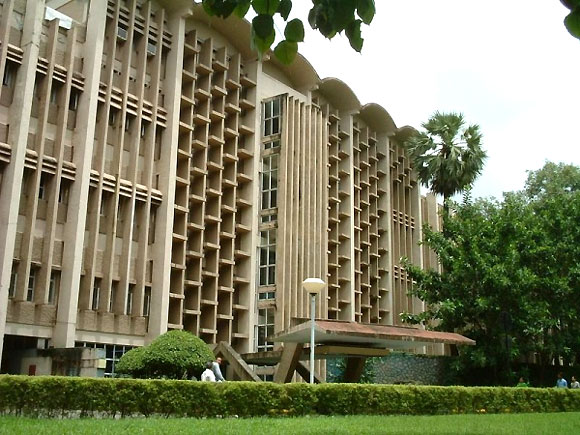Photographs: Rohan Sethi/Wikimedia Commons Dinesh Mohan
The inference that the IIT brand name has been devalued is unfair; this could as well reflect a wider market for student choices, feels Dinesh Mohan.
The results of the Joint Entrance Examination (JEE)-Advanced were declared last week. The successful applicants are eligible for admission to the seven older Indian Institute of Technology (IITs), eight IITs established recently, IIT (BHU) Varanasi and ISM-Dhanbad.
A newspaper report says: "A total of 769 students did the unthinkable this year: they refused to study in an IIT after getting in. It's a rare situation where even general category seats in various IITs across the country have remained vacant after the first round of admission."
This report and anecdotal information gives the impression that the "brand name" of IITs may be somewhat devalued.
This is not entirely fair, as having the same name does not necessarily mean that all campuses will have the same quality of education. For example, the University of California has 10 different campuses but all of them do not have the same reputation as the one located at Berkeley.
In our case, you really cannot expect the eight new IITs to have the same reputation, in a few years, as the older ones that have been around for more than five decades.
The fact is we neglected the establishment of quality public education institutions, both at the school and university level for over three decades.
This is reflected by the fact that out of approximately 300,000 seats available in the engineering stream in the country, about 10,000 are in the IITs. Another 15,458 seats are available in National Institutes of Technology (NITs).
Which means that less than 10 per cent of those aspiring to be engineers can do so at reasonable costs and get a decent education. Among the private institutions less than 10 per cent seem to be providing somewhat quality education.
Click on NEXT for more...
Why have some students rejected IIT?
Photographs: Reuters
Then why have some of the eligible students decided not to study at the IITs? There could be many reasons.
Students have become acutely aware that all disciplines do not offer challenging or rewarding jobs after graduation (such as civil, production, textile, and many others).
Therefore, some of them may prefer to go to an NIT closer to home that gives them an opportunity in a discipline of their choice.
Studying at an IIT for undergraduate students can cost about Rs 20,000 a month, not a small amount for a middle-class family.
Some of those declining may have opted to spend less by studying at a local NIT instead of a new IIT and save on hostel expenses.
A significant proportion of the students entering IITs know from day one that they are not interested in an engineering career, but do so under parental and societal pressure or a lack of choices for obtaining decent education.
If there was a good supply of excellent liberal arts and science colleges with hostel facilities, applications to IITs may drop by a third.
It is possible that some of those declining an admission to IIT have gained admission to good law schools, design schools or science colleges that have made a name for themselves in recent years.
Click on NEXT for more...
Why have some students rejected IIT?
Photographs: Reuters
Lastly, there would be a group of young men and women who would prefer to spend much more money and go to an institution in the US, Australia, Singapore or the UK, even a second-rate one, than take admission in a discipline and IIT location they don't like.
Therefore, the fact that many applicants have opted out of the IIT system may be a good sign, showing that we have more choices and the system is maturing. It certainly does not reflect on the standing of IITs as academic institutions in India.
Some newspaper reports have suggested that the applicants may not want to enter the new IITs because they may be inferior to the old ones.
Such comments are not entirely true. Admission data show that many students with high ranks in the JEE are selecting newer IITs over the older ones. The reasons are not entirely clear, but it seems that discipline and location may be playing an important role.
The insinuation that the IITs may have deteriorated in academic excellence is absolutely unfounded.
As far as research output is concerned, the academic quality of faculty members at all the IITs has improved considerably over the past two decades.
Now, the older IITs get significantly more research and consultancy contracts than they did a decade ago and postgraduate students comprise about 60 per cent of our production.
Some of the newer IITs are also making brave efforts to modernise curricula and break out of older ways of academic functioning.
Click on NEXT for more...
Why have some students rejected IIT?
Photographs: Akshat Gupta/Wikimedia Commons
I am not really worried about some students opting out of the IIT system. Given the anti-intellectual character of the Indian decision-makers (politicians, bureaucrats and business people) over the past few decades, the IIT system has survived reasonably well and brought us where we are.
The future is going to be more challenging. The IIT system itself will have to shed its silo mentality and embrace new disciplines, encourage lateral entry at senior levels, and become much more interdisciplinary in nature.
No major centre of learning has maintained its standing without doing this.
The IIT system will also need an enabling environment that makes it possible for them to thrive academically. Potential teachers need to get a free education right through primary school to PhD.
Products of IITs need to find jobs that require the use of their technical education and challenge their brains. This will need some doing.
Dinesh Mohan is Volvo Chair Professor Emeritus, Transportation Research and Injury Prevention Programme at the Indian Institute of Technology, Delhi






article